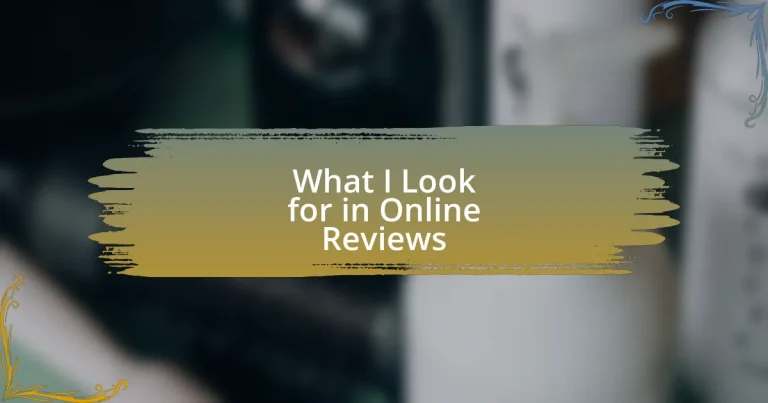Key takeaways:
- Online alcohol reviews are valuable for their personal stories and diverse opinions, which enhance the understanding of taste and encourage exploration.
- Authenticity and clarity in reviews are crucial; personal experiences and straightforward descriptions create emotional connections and resonate with readers.
- Evaluating reviewer credibility involves considering their expertise, balance in opinions, and engagement with the audience, all of which build trust.
Author: Clara Whitmore
Bio: Clara Whitmore is an acclaimed author and storyteller known for her captivating narratives and richly drawn characters. Her work spans several genres, including contemporary fiction and historical romance, often weaving elements of personal experience into her writing. Clara holds a Master’s degree in Creative Writing from the University of Edinburgh and has published three novels, which have garnered critical acclaim and a loyal readership. When she’s not writing, Clara enjoys exploring quaint bookstores and hosting literary workshops. She currently resides in Portland, Oregon, with her dog, Jasper.
Understanding Online Reviews
Online reviews serve as a window into the experiences of others, allowing us to gauge the quality of a product before making a purchase. I often find myself scrolling through these reviews, looking to see if anyone mentions the flavor profile of a new whiskey I’m curious about. Isn’t it interesting how one person’s glowing recommendation can sway our decision, while another’s critique makes us hesitate?
When I consider the usefulness of reviews, I look for patterns rather than isolated opinions. For instance, if multiple reviewers highlight a spirit’s smoothness or its unique aromas, I start to believe there’s some authenticity behind the hype. It’s funny how reading a few honest evaluations feels like chatting with friends who share my passion for exploring new beverages.
Yet, I can’t help but wonder about the authenticity of some reviews. Have you ever encountered a review that seemed overly polished or vague? Those can raise red flags for me. I tend to trust reviews that feel personal and genuine, as they resonate more with my own experiences. This instinct drives me to sift through the noise to find insights that truly matter, ensuring my next bottle choice is worth savoring.
Importance of Alcohol Reviews
When diving into the world of alcohol reviews, I realize their importance extends far beyond mere ratings. Each review often reflects an individual’s personal journey with a particular drink, and I find that these stories create a deeper connection to the product. Have you ever read a review that described a memorable evening over a fine wine? That’s the kind of detail that sticks with me and influences my choices.
Another aspect I appreciate is the diversity of opinions available in the online landscape. For example, I’ve come across reviews where some users adore the boldness of a craft beer while others find it overwhelming. This range provides valuable insights; it reminds me that taste is subjective and encourages me to explore beyond my comfort zone. The thrill of trying something new often comes from understanding everyone’s unique perspectives.
Ultimately, the power of alcohol reviews lies in their ability to inform and spark curiosity. There’s something poetic about knowing that my next favorite drink could be just a recommendation away. Reflecting on my own experiences, I cherish the moments when I discovered a hidden gem based on someone else’s candid words. Those shared experiences transform my drinking adventures into treasured memories.
Key Elements of Alcohol Reviews
When I read alcohol reviews, I always look for sensory descriptions that paint a vivid picture of the drink. For instance, a reviewer might describe a whiskey’s smooth caramel notes or the way a summer cocktail brightens up a hot afternoon. It makes me feel as if I’m right there, savoring the drink alongside them. Those details often influence my choice more than the star ratings ever could.
Another crucial element I pay attention to is the reviewer’s background and context. Knowing whether someone typically prefers sweet wines or robust bourbons helps me gauge their perspective. I remember reading a review from an enthusiast who shared how a particular gin reminded them of family gatherings. That kind of personal touch resonates with me and adds depth to the review, transforming it from a simple opinion to a shared experience.
User-contributed tips or serving suggestions also catch my eye. Sometimes, a reviewer will recommend pairing a specific beer with a certain dish, and that piques my interest. It prompts me to think: how can I enhance my own enjoyment of the drink? I recall trying a craft stout suggested for winter evenings, and it truly elevated my cozy nights in. These insights are gems that lead to memorable experiences beyond just tasting the drink.
What I Value Most
When I read online alcohol reviews, one aspect I value most is authenticity. A genuine voice resonates with me; it makes the review feel sincere. I once stumbled upon a review where the writer described the imperfections of a particular wine, admitting it wasn’t perfect but still enjoyable. That honesty helped me appreciate the reviewer’s perspective and made me more inclined to trust their recommendations.
Clarity is another key factor I look for. If a reviewer can explain tasting notes or production methods in straightforward terms, it instantly captures my attention. I vividly remember a review that broke down a whiskey’s profile, using comparisons that made it easier to relate. It’s almost like having a friend break down their favorite drink, which encourages me to explore new options without feeling overwhelmed by jargon.
Finally, I find personal experiences woven into reviews to be incredibly enriching. A reviewer who recounts a meaningful story about a drink, like enjoying a favorite cocktail at a wedding, creates an emotional connection that elevates their insight. It gets me thinking—what memories can I make with this drink? That thought adds a layer of significance to my choices, making each sip not just about flavor, but also about the moments I can create.
Evaluating Taste Descriptions
When evaluating taste descriptions in alcohol reviews, I always pay attention to how reviewers articulate flavors. A vivid description can transport me back to a specific tasting experience. For instance, I once read about a gin that was likened to sipping a crisp garden after the rain. That imagery made it come alive for me and sparked my curiosity to try it for myself.
Moreover, I look for the balance in tasting notes. If a reviewer mentions multiple flavors, I appreciate when they analyze how these flavors interact. I recall reading a review of a dark beer where the writer highlighted the chocolate notes alongside bittersweet coffee undertones. They explained how these flavors complemented rather than clashed, which made me rethink my own palate. Who wouldn’t want to explore such a harmonious drink?
Finally, I think about the emotional context of taste descriptions. A review that shares how a drink might pair with certain moments in life truly resonates. For example, a reviewer once shared how a certain whiskey reminded him of cold winter nights spent by the fireplace. It made me envision cozy evenings with friends, and suddenly, that whiskey seemed more appealing than mere numbers on a label. How can you not cherish a drink that feels like a warm embrace on a chilly night?
Assessing Reviewer Credibility
When assessing reviewer credibility, I often consider their background and expertise in the alcohol industry. A reviewer who has spent years tasting and critiquing beverages brings a level of knowledge that I truly value. I remember stumbling upon a review written by a sommelier who detailed the nuances of wine aging—insights that transformed my understanding of what makes a bottle exceptional. Doesn’t it instill more confidence when the person behind the review clearly knows their stuff?
Next, I give weight to the balance of opinions expressed by the reviewer. If someone frequently rates every drink highly, it raises a flag for me. I once came across a reviewer who provided constructive criticism along with praise, and it painted a clearer picture of their tasting experience. This approach made their perspective feel genuine and trustworthy. How can I fully appreciate a review if it lacks that honest assessment?
Finally, I look for the engagement levels between the reviewer and their audience. When a reviewer actively responds to comments, it suggests they value feedback and are willing to foster a community. I once saw a reviewer answer a question about food pairings, sharing personal experiences that resonated with readers. This kind of interaction not only builds credibility but also creates a sense of connection. Wouldn’t you agree that a reviewer who engages with their audience often has a more authentic perspective on the drinks they review?
Making Informed Choices
When it comes to making informed choices in online alcohol reviews, I pay close attention not just to the star ratings, but to the content behind them. One time, I encountered a detailed review where the writer shared their personal journey with a particular whiskey, touching on the flavors and feelings it evoked. This emotional connection helped me understand the drink on a deeper level. Isn’t it fascinating how a story can elevate a review from mere information to something truly engaging?
Furthermore, I find that comparing multiple reviews enhances my decision-making process. I recall trying a new craft beer after reading a variety of perspectives, some praising its boldness and others critiquing its bitterness. Each viewpoint shaped my expectations, leading to a richer tasting experience. How often do we rely on a single source when several voices can provide a fuller picture?
Lastly, I always consider the detail level in reviews. A product might receive a glowing review, but without context or specifics, I feel uncertain. I once saw a sparkling wine described as “refreshing” without any mention of its taste profile or aroma. It left me wondering—how can a reviewer expect me to appreciate something without painting a complete picture? I prefer when reviewers dive into the complexities, allowing me to visualize the experience before I make a purchase.


